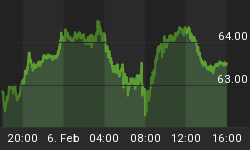Last week, we mentioned that Ed Hyman raised his GDP growth forecast throughout the month of February. Bloomberg reported this week that Hyman was not the only economist that is more optimistic. According to a survey conducted by Bloomberg, the consensus estimate for first quarter GDP growth increased to 4.0% from 3.6% last month. Conversely, economist lowered their forecasts for consumer spending by 20 basis points to 3.1%. Microsoft's Chairman, Bill Gates, echoed similar comments this week saying, "I see a very positive attitude towards the economy and investment... The willingness to invest in new projects is quite high - not what it was in the late '90s, but we may never see that again in our lifetimes."
The past two Beige Book reports from the Federal Reserve reported economic expansion in eleven of the twelve districts. Cleveland was the lone holdout. The latest report said that "All twelve districts indicated that economic activity has increased." Richmond reported a deceleration in growth that stemmed from "weaker growth at services firms and nearly flat retail sales." New York and San Francisco reported "brisk growth." Consumer spending was "steady to up moderately" with six of the districts reporting that spending strengthened, but was little changed in the other half of the districts. While overall consumer spending increased, auto sales were described as "sluggish" in a few districts, namely Richmond, Kansas City, Dallas, and San Francisco. Three districts saw auto sales increase, but it was following a weak January. In fact, the past two months have been the weakest two month totals for vehicle sales since February - March 2003.
Retail sales were mixed around the country, but were generally described as close to plan and slightly ahead of year-ago levels. This is quite contradictory to the results that retailers reported last week. The ICSC reported that chain store sales jumped 4.9% from last February. This was the largest increase since May and is on top of last year's 6.7% gain. According to CSFB, same store sales increased by 4.3%, led by a 3.5% increase in broadline retailers. Softline merchandisers increased sales by 3.8%, while those selling hardlines fell 2.7%. According to the Beige Book, retailers were optimistic for the rest of the year.
Factory orders increased 0.2% in January from the previous month. While it was the slowest pace since September, it was higher than economists' forecasts and December factory orders were revised up to 0.5% from 0.3%. Additionally, on a year-over-year basis, orders were up a strong 11.3%. The Beige Book affirmed factory orders probably increased in February as, "Nearly all Districts reported continued expansion in manufacturing activity." The report said that while manufacturing activity expanded, "the pace of growth has generally not increased since the last report." This would confirm the latest reports from the ISM, in which growth has steadily declined over the past ten months, but has remained above 50. Defense and machine tool production were singled out as being "strong" and "solid." As expected, higher costs were mentioned as a concern. Steel and energy were specifically mentioned. While steel costs have declined recently, the Cleveland report noted that contracts were currently being renegotiated and could result in higher effective prices. Some districts noted the recent drop in energy prices were helping stabilize input price increases. The data was collected prior to February 28, so the increase in oil is not reflected in the report. The declining dollar is being cited more as a cause of higher import prices. Manufacturers are also able to pass along these increases. Concerned about inflation, the bond market focused on this particular passage:
Despite the stability in consumer goods prices, manufacturers in a number of Districts - including Boston, Cleveland, Kansas City, and Dallas - indicated that they have been finding it increasingly easy to pass along price increases; Philadelphia producers anticipated greater ability to boost prices in the near future. Also, truckers in the Cleveland and Atlanta Districts indicated that they have been offsetting rising fuel costs with surcharges."
At this point the prices increases have stopped at the consumer level. Retailers reported that prices were "generally flat or up modestly, however businesses continued to face rising input costs."
Rising employee costs are also pressuring businesses, "Reports of ongoing sharp increases in benefit costs, particularly health insurance, were fairly widespread." Additionally, several districts reported that there were "scattered skilled labor shortages." Even manufacturers reported adding workers in five districts. According to the February employment report, the manufacturing sector added 20,000 jobs. This was the first month since August that manufactures added employees. The non-manufacturing ISM report indicated that the service sector anticipates adding workers.
There might be some cracks appearing in the residential housing market, albeit very, very faint cracks. While sales in Atlanta and San Francisco were "brisk," there were three districts that reported "some pullback." These weaker markets were Minneapolis, Kansas City, and Dallas. Another faint crack, was the announcement from Ryland Group that its earnings will be lower than previously articulated for the current quarter. The home builder said that there are 225 home closings that will be pushed into future quarters because of "adverse weather." The commercial real estate market started rebounding last year and have remained "stable." Half the districts reported a pickup in commercial construction.
It should be clear that the economy is expanding. Over the past couple of months we have highlighted several examples from company conference calls that provided similar insight as the recent Beige Book. Comments from the Beige Book combined with escalating energy prices along with other commodities, the CRB index hit the highest level since December 1980, sent 10-year bond yields to highest level since July 2004. While the economy is growing faster than economists were forecasting, higher interest rates could cause a significant and abrupt deceleration.















